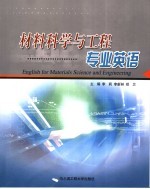图书介绍
材料科学与工程专业英语2025|PDF|Epub|mobi|kindle电子书版本百度云盘下载

- 李莉,李新林,郑卫主编(哈尔滨工程大学材化学院) 著
- 出版社: 哈尔滨:哈尔滨工程大学出版社
- ISBN:7810738941
- 出版时间:2006
- 标注页数:326页
- 文件大小:23MB
- 文件页数:336页
- 主题词:材料科学-英语-阅读教学-自学参考资料
PDF下载
下载说明
材料科学与工程专业英语PDF格式电子书版下载
下载的文件为RAR压缩包。需要使用解压软件进行解压得到PDF格式图书。建议使用BT下载工具Free Download Manager进行下载,简称FDM(免费,没有广告,支持多平台)。本站资源全部打包为BT种子。所以需要使用专业的BT下载软件进行下载。如BitComet qBittorrent uTorrent等BT下载工具。迅雷目前由于本站不是热门资源。不推荐使用!后期资源热门了。安装了迅雷也可以迅雷进行下载!
(文件页数 要大于 标注页数,上中下等多册电子书除外)
注意:本站所有压缩包均有解压码: 点击下载压缩包解压工具
图书目录
Part 1 Introduction to Materials Science and Engineering1
Chapter 1 Introduction1
1.1 Historical Perspective1
Catalog1
1.2 Importance of Materials Science and Engineering2
1.3 Advanced Materials3
1.4 Modern Materials Needs3
Part 2 Physical Foundations of Materials Science5
Chapter 2 Atomic Structure and Interatomic Bonding5
2.1 Introduction5
2.2 Atomic Structure5
2.3 Electrons in Atoms6
2.4 The Periodic Table9
2.5 Atomic Bonding in Solids11
2.6 Primary Interatomic Bonds13
3.2 Crystal Structures20
Chapter 3 The Structure of Crystalline Solids20
3.1 Introduction20
3.3 Crystallographic Directions29
3.4 Crystalline and Noncrystalline Materials30
Chapter 4 Imperfections in Solids34
4.1 Introduction34
4.2 Point Defects34
4.3 Miscellaneous Imperfection38
4.4 Grain Size Determination44
Chapter 5 Diffusion47
5.1 Introduction47
5.2 Diffusion Mechanisms48
5.3 Steady-State Diffusion50
5.4 Nonsteady-State Diffusion51
5.5 Factors That Influence Diffusion53
6.2 Definitions and Basic Concepts56
Chapter 6 Phase Diagrams56
6.1 Introduction56
6.3 Phases58
6.4 Phase Equilibrium59
6.5 Equilibrium Phase Diagrams60
6.6 Interpretation of Phase Diagrams63
Chapter 7 Phase Transformations in Metals75
7.1 Introduction75
7.2 Phase Transformations76
7.3 Microstructural and Property Changes in Iron-Carbon Alloys78
7.4 Mechanical Behavior of Iron-Carbon Alloys89
Part 3 Physical Properties of Materials94
Chapter 8 Electrical Properties94
8.1 Introduction94
8.2 Electrical Conduction95
8.3 Energy Band Diagrams and Number of Charge Carriers100
8.4 Classifications of Conductors103
8.5 Ionic Conduction Mechanisms108
8.6 Effects of Defects and Impurites108
8.7 Superconductivity111
Chapter 9 Thermal Properties114
9.1 Introduction114
9.2 Coefficient of Thermal Expansion114
9.3 Heat Capacity117
9.4 Thermal Conduction Mechanisms118
9.5 Thermal Stresses120
Chapter 10 Magnetic Properties124
10.1 Introduction124
10.2 Basic Concepts125
10.3 Ferromagnetism126
10.4 Common Magnets131
11.2 Optical Properties137
Chapter 11 Optical Properties137
11.1 Introduction137
11.3 Interactions of Light with Solids138
11.4 Atomic and Electronic Interactions138
11.5 Optical Properties of Metals140
11.6 Optical Properties of Non-Metals141
11.7 Applications of Optical Phenomena145
Part 4 Mechanical Properties of Materials150
Chapter 12 Mechanical Properties of Metals150
12.1 Introduction150
12.2 Concepts of Stress and Strain151
12.3 Elastic Deformation155
12.4 Tensile Properties159
13.1 Introduction172
13.2 Dislocations and Plastic Deformation172
Chapter 13 Dislocations and Strengthening Mechanisms172
13.3 Mechanisms of Strengthening in Metals180
13.4 Recovery,Recrystallization and Grain Growth185
Chapter 14 Failure188
14.1 Introduction188
14.2 Fracture188
14.3 Fatigue203
14.4 Creep214
Chapter 15 Corrosion and Degradation219
15.1 Introduction219
15.2 Nature of Corrosion220
15.3 Effect Factors of Corrosion223
15.4 Types of Corrosion229
15.5 Determination of Corrosion Characteristics239
15.6 Corrosion control241
16.2 Annealing Processes246
16.1 Introduction246
Chapter 16 Thermal Processing of Metal Alloys246
Part 5 Processing246
16.3 Heat Treatment of Steels250
16.4 Precipitation Hardening254
Part 6 Materials and Design260
Chapter 17 Metal Alloys260
17.1 Introduction260
17.2 Fabrication of Metals260
17.3 Ferrous Alloys266
17.4 Nonferrous Alloys271
Chapter 18 Ceramics280
18.1 Introduction280
18.2 Ceramic Structures281
18.3 Ceramic Phase Diagrams284
18.4 Mechanical Properties285
18.5 Applications of Ceramics289
Chaper 19 Polymers297
19.1 Introduction297
19.2 Polymerization Reactions298
19.3 Types of Polymers302
19.4 Strengthening Mechanisms305
Chapter 20 Composites311
20.1 Introduction311
20.2 Classifications of Composites312
20.3 Particle-Reinforced Composites313
20.4 Fiber-Reinforced Composites315
20.5 Structural Composites317
Chapter 21 Materials Selection and Design Considerations320
21.1 Introduction320
21.2 The Property Spectrum320
21.3 Selection of Materials322
21.4 Design with Materials324